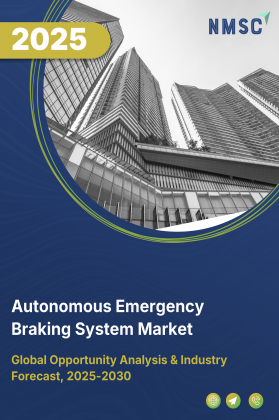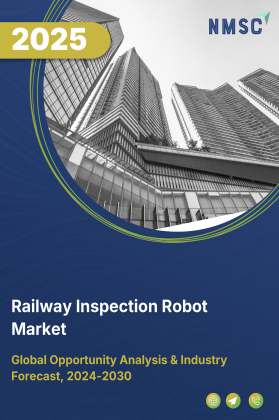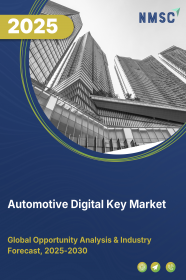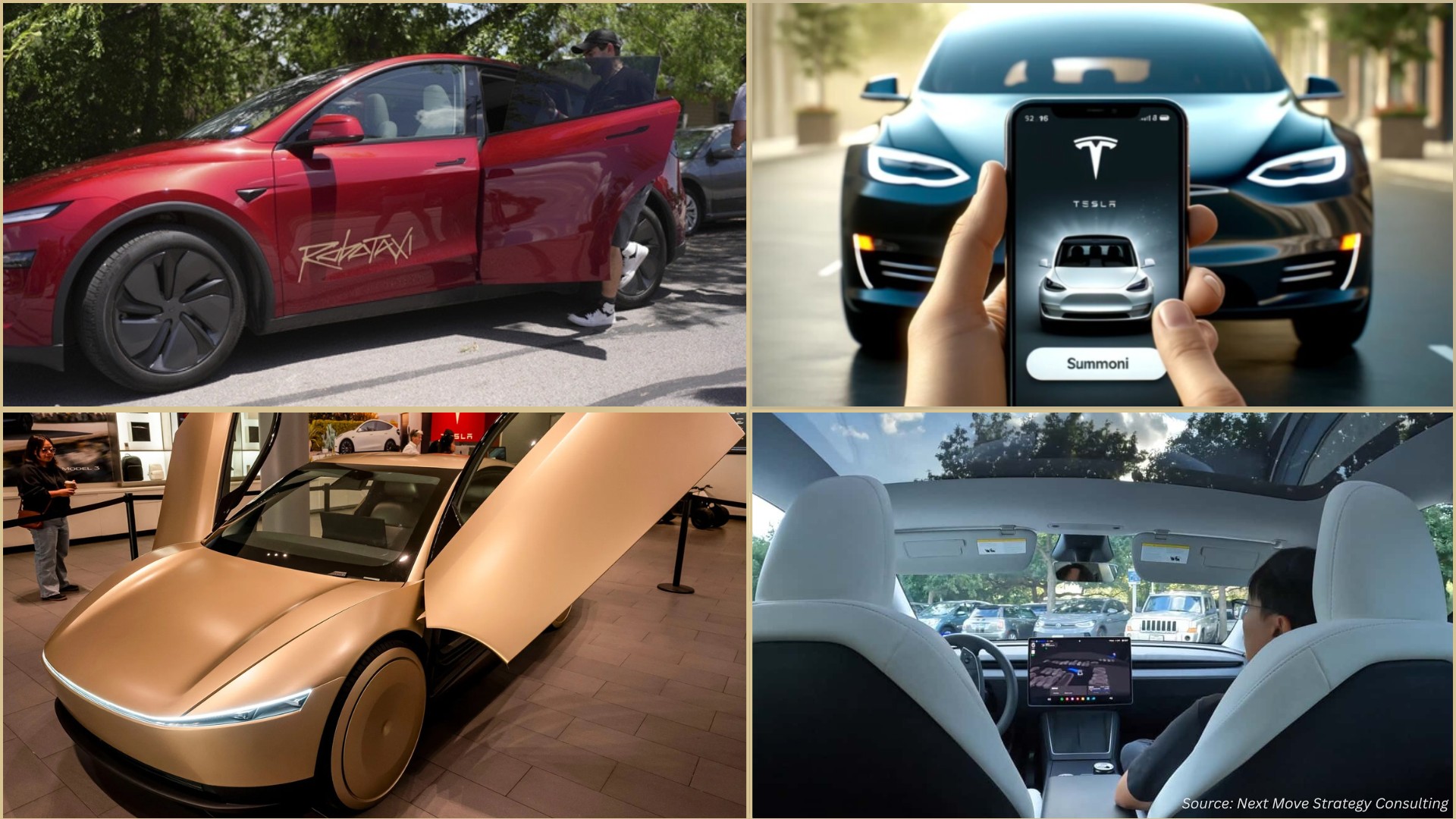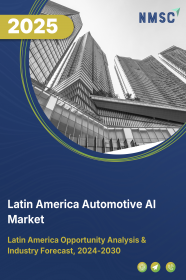
Latin America Automotive AI Market by Component (Hardware, Software, and Services), by Technology (Machine Learning & Deep Learning, Computer Vision, and Natural Language Processing), and by Application (Semi-Autonomous and Fully Autonomous) - Opportunity Analysis and Industry Forecast, 2024– 2030
Industry: Automotive & Transportation | Publish Date: 29-Apr-2025 | No of Pages: 130 | No. of Tables: 93 | No. of Figures: 58 | Format: PDF | Report Code : AT1740
Market Definition
The Latin America Automotive AI Market size was valued at USD 193.5 million in 2023, and is predicted to reach USD 1260.9 million by 2030, at a CAGR of 30.7% from 2024 to 2030. Automotive Artificial Intelligence, or Automotive AI, refers to the application of machine learning and artificial intelligence technologies in the design, development, and operation of vehicles and related systems within the automotive industry. Automotive AI consists a wide range of applications, including autonomous driving, advanced driver assistance systems (ADAS), predictive maintenance, natural language processing for in-car voice recognition, and improving the overall efficiency and safety of vehicles. This technology enables vehicles to perceive their surroundings, make decisions, and interact with drivers and passengers. This further enhances the driving experience, safety, and efficiency of automotive systems.
Surge in Connected Vehicles is Driving the Adoption of Automotive AI
The automotive industry is witnessing a notable increase in the demand for connected vehicles, marking a pivotal driver for the widespread adoption of Artificial Intelligence (AI). Connected vehicles, leveraging advanced communication technologies and the Internet of Things (IoT), enable real-time data exchange and improved user experiences. In response to this trend, AI plays a crucial role in processing and analyzing the extensive data generated by connected vehicles. Machine learning algorithms contribute to insights into user behavior, traffic patterns, and vehicle performance. This integration of AI in connected vehicles results in features such as predictive maintenance, remote diagnostics, and intelligent navigation systems, transforming traditional automobiles into smart, data-driven platforms. As the demand for connectivity continues to rise, the automotive industry is increasingly relying on AI to deliver vehicles that are not only connected but also smarter, safer, and more efficient.
Increasing Demand for the Electric Vehicles is Driving the Growth of the Market
The surging demand for electric vehicles (EVs) is significantly driving the automotive landscape. Also, the integration of artificial intelligence (AI) is playing a pivotal role in optimizing various sides of electric vehicle technology. AI is at the forefront of battery management, where advanced algorithms monitor and predict battery health, ensuring longevity and reliability. Additionally, machine learning is harnessed to enhance the energy efficiency of EVs, optimizing power usage and improving range prediction accuracy. The optimization of charging infrastructure, personalized user experiences through natural language processing and voice recognition, and the implementation of predictive maintenance contribute to a seamless and efficient electric vehicle ownership experience. As the automotive industry continues to transition towards sustainability, the synergy between AI and electric vehicles is driving innovations that not only meet environmental goals but also elevate the overall performance and user satisfaction within the electric vehicle market.
Standardization Challenges Associated with Automotive AI Hinders the Market Expansion
The lack of standardization poses a significant challenge in the realm of automotive AI, as the industry grapples with the absence of universally accepted protocols governing the development and deployment of these advanced technologies. This deficiency gives rise to interoperability issues, making it challenging for AI systems from different manufacturers to communicate seamlessly. Compatibility challenges arise as proprietary technologies diverge, hindering the creation of a cohesive and interconnected automotive AI ecosystem. Furthermore, this absence of common standards leads to market fragmentation, making it difficult for stakeholders to navigate and understand the rapidly evolving landscape of automotive AI.
The Rising Prevalence of Advanced Driver Assistance Systems (ADAS) Create Opportunities for the Market
Advanced Driver Assistance Systems (ADAS) represent a pivotal aspect of automotive safety and convenience, employing sensors and cameras to enhance driving experiences. The integration of artificial intelligence (AI) into ADAS plays a crucial role in transforming these systems into intelligent, responsive mechanisms. AI algorithms, powered by machine learning, analyze real-time data from sensors, enabling features such as adaptive cruise control, lane-keeping assistance, and automatic emergency braking. The future opportunity in this domain lies in the continuous refinement of ADAS functionalities through advancements in AI, promising improved accuracy, responsiveness, and a broader range of capabilities.
As the automotive industry continues its pursuit of safer and more efficient driving, the integration of AI into ADAS stands at the forefront, paving the way for the development of increasingly sophisticated and reliable driver assistance technologies. The growing demand for enhanced safety features and regulatory emphasis on advanced technologies in vehicles underscore the immense potential for the automotive AI market within the ADAS segment.
Competitive Landscape
The market players operating in the Latin America automotive AI market include NVIDIA Corporation, Alphabet, Inc., Intel Corporation, Microsoft Corporation, IBM Corporation, Qualcomm, Inc., Tesla, Inc., BMW AG, Micron Technology, Xilinx, Inc.
Latin America Automotive AI Market Key Segments
By Component
-
Hardware
-
Software
-
Services
By Technology
-
Machine Learning & Deep Learning
-
Computer Vision
-
Natural Language Processing
By Application
-
Semi-Autonomous
-
Fully Autonomous
By Region
-
Latin America
-
Brazil
-
Mexico
-
Argentina
-
Colombia
-
Chile
-
Peru
-
Other Countries
-
Key Players
-
NVIDIA Corporation
-
Alphabet, Inc.
-
Intel Corporation
-
Microsoft Corporation
-
IBM Corporation
-
Qualcomm, Inc.
-
Tesla, Inc.
-
BMW AG
-
Micron Technology
-
Xilinx, Inc.
REPORT SCOPE AND SEGMENTATION:
|
Parameters |
Details |
|
Market Size in 2023 |
USD 193.5 Million |
|
Revenue Forecast in 2030 |
USD 1260.9 Million |
|
Growth Rate |
CAGR of 30.7% from 2024 to 2030 |
|
Analysis Period |
2023–2030 |
|
Base Year Considered |
2023 |
|
Forecast Period |
2024–2030 |
|
Market Size Estimation |
Million (USD) |
|
Growth Factors |
|
|
Companies Profiled |
10 |
|
Market Share |
Available for 10 companies |
|
Customization Scope |
Free customization (equivalent up to 80 working hours of analysts) after purchase. Addition or alteration to country, regional, and segment scope. |
|
Pricing and Purchase Options |
Avail customized purchase options to meet your exact research needs. |




















 Speak to Our Analyst
Speak to Our Analyst



